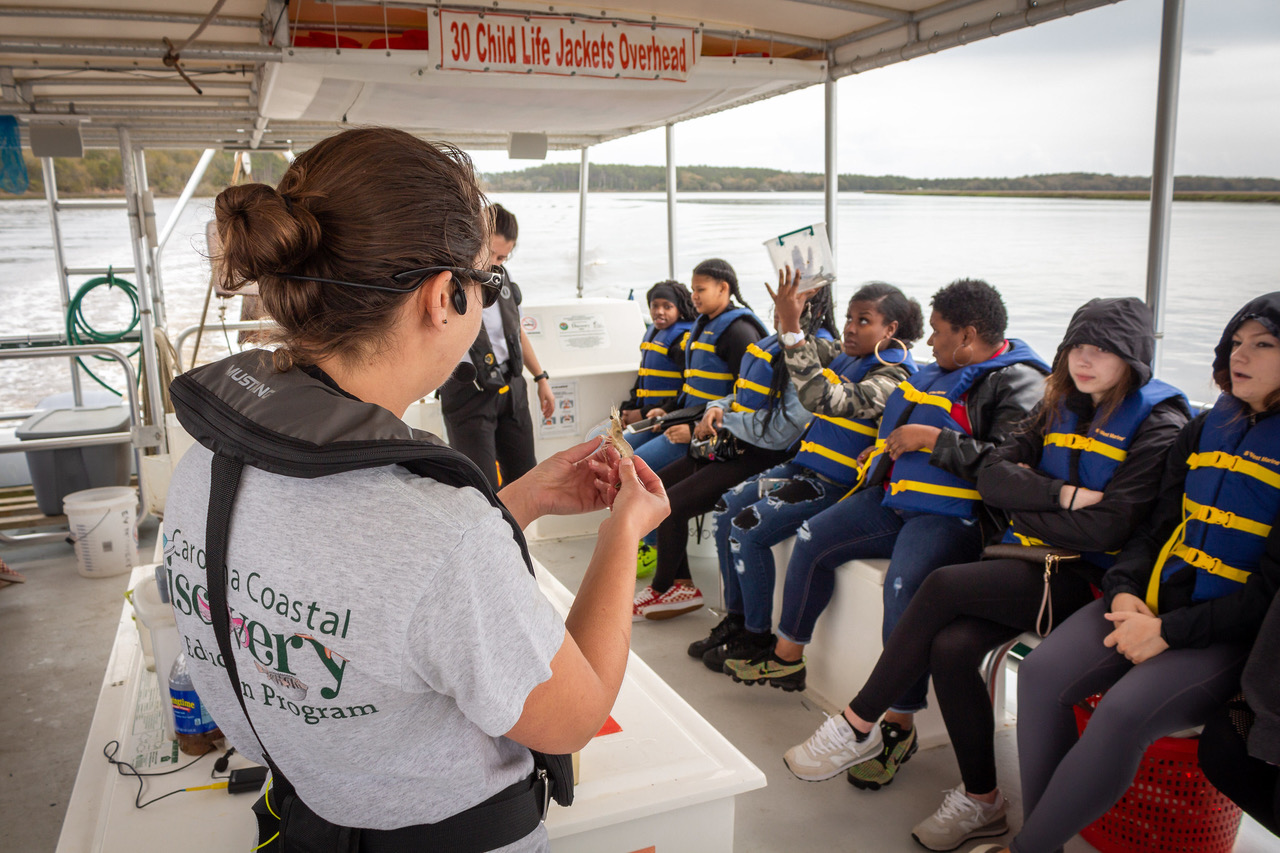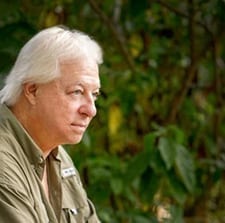Learning Along The Estuary
October 18, 2023By Tom Poland
The children of Sandy Island board a school bus boat for an eight-minute journey across the Waccamaw River to the mainland. There, they ride a traditional bus to public schools. A school bus boat brings to mind a floating classroom. Wouldn’t it be great if South Carolina had a floating classroom where all students could learn about our coast and its estuaries?
Well, it does, the South Carolina Department of Natural Resources’ Coastal Discovery, a 45-foot catamaran. To revise a line from the Who’s “Going Mobile,” the Carolina Coastal Discovery Marine Education Program went mobile twenty years ago. The Coastal Discovery’s takes people to an intriguing classroom—estuaries where learning takes place in a real lab.
Consider the Atlantic Horseshoe Crab, a species of study. These evolutionary survivors’ eggs provide a much-needed food source for migratory birds. What makes this important? Eastern North America’s red knots have declined owing in part to a lack of horseshoe crab eggs. As a result, the red knot has become a flagship species for shorebird conservation in the twenty-first century.

Erica Connery puts learning along the estuary into action aboard the Coastal Discovery, a 45-foot catamaran. Photo courtesy of SC DNR.
The horseshoe crab’s blood plays a vital role in human medicine as well. Pharmaceutical companies use horseshoe crab blood cells to test vaccines and drugs. Nature is all about connections. Here’s a species that helps red knots and man. Learning along the estuaries, it’s real and exciting.
Here’s another example of Coastal Discovery’s learning along estuaries. Atlantic guitarfish bury themselves in the mud and sand when threatened. Students learned, too, that Atlantic guitarfish give birth to live young and can have as many as six young in one litter. That name? A long, pointed nose and guitar-shaped body give the guitarfish its common name.
Back in 2016 the Coastal Discovery’s Salt Marsh STEAM workshop encouraged creative ways teachers can incorporate Science, Technology, Engineering, Art and Mathematics into their classrooms. Teachers On The Estuary (TOTE) used the Edisto River watershed as a classroom. The program helped teachers involve students in project-based learning using real-world examples. They connected their classroom to the estuary regardless of where they lived.
The Coastal Discovery and its staff give teachers and students an opportunity to perform science investigations using field-sampling techniques and equipment used in current research methods. Captain Fred Dockery, Education Coordinator Julie Blinz, and Education Specialist Kacie Ferguson round out the crew. Consider them educators afloat. Teachers, you want kids to learn about our estuaries? Kids, you want to see estuarine ecology firsthand? The Coastal Discovery’s your vessel to knowledge.
Erica L. Connery is South Carolina DNR’s Education Coordinator. “We offer this free field trip opportunity to schools to tie classroom curriculum to real-world research and an understanding of the environments we live in,” said Connery. “We have recently transitioned to a lottery system for our field trip booking since it is in very high demand, and we offer a few public trips throughout the year.”
The Harry Hampton Wildlife Fund bought the original set of twin outboards for the Coastal Discovery, helping it to go mobile. “Total grant funding DNR has received from HHWF for Discovery programs is $118,853,” said Jim Goller, executive director of the Harry Hampton Wildlife Fund. The floating classroom focuses on estuarine ecology while providing people a vital connection to local conservation issues and broad science concepts. As well, it helps develop critical science investigation skills. The mission is a good one. Creating coastal stewards for the future of South Carolina’s fisheries and coasts.
This innovative program began in 2003 when the SCDNR Marine Resources Division purchased the Educational Vessel (E/V) to better teach South Carolinians about our marine resources. Now known as the Coastal Discovery, it can carry up to 35 passengers, tow a small trawl, use a small crane for hydrographic gear and plankton nets, and full array of electronics. It makes for a real environment where teachers and students see estuarine ecology in action.
The Carolina Coastal Discovery Marine Education program reaches over 5,000 students per year. Through grant funding from the Harry Hampton Wildlife Fund and others it offers free field trips to schools throughout South Carolina. Some of those students could well be future coastal stewards. An estuarine education, it’s a good thing for South Carolina, for the world.
To learn more about the Coastal Discovery and the Harry Hampton Wildlife Memorial Fund visit their respective websites.
Georgia native Tom Poland writes a weekly column about the South, its people, traditions, lifestyle, and culture and speaks frequently to groups in the South. Governor Henry McMaster conferred the Order of the Palmetto upon Tom, South Carolina’s highest civilian honor, stating, “His work is exceptional to the state.” Poland’s work appears in books, magazines, journals, and newspapers throughout the South.
Visit Tom’s website at www.tompoland.net
Email him at [email protected]





















